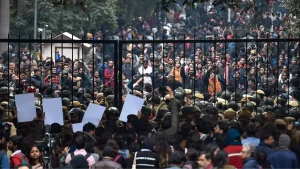New Delhi – The Delhi Police registered a case on Sunday and bound down six students following a confrontation at Jawaharlal Nehru University‘s West Gate, where JNU clash students comprising members from the students’ union and Left-affiliated groups faced off with police personnel on Saturday. The incident has sparked controversy over police handling of student protests and allegations of excessive force during the detention process.
While no formal arrests were made, the bound down JNU clash students include JNUSU president Nitish Kumar, 26; vice-president Manisha, 28; general secretary Munteha Fatima, 28; Manikant Patel, 27; Briti Kar, 27; and Saurya Majumdar, 28. These six individuals were among 28 students taken to Kapashera police station from the protest site on Saturday evening.
Understanding the ‘Bound Down’ Legal Status

When are bound down, they face a unique legal restriction that differs from formal arrest. Under this status, individuals are not legally arrested but are required to appear before police whenever summoned. This legal mechanism allows authorities to maintain oversight over the accused while avoiding the complications and scrutiny associated with formal arrests of the JNU clash students.
Deputy Commissioner of Police (Southwest) Amit Goel clarified that other detained individuals were held under Section 65 of the Delhi Police Act, which pertains to obeying police directions. These JNU clash students were handed over to their professor following medical examination, suggesting concerns about potential injuries sustained during the confrontation.
Legal Charges Filed in the Case
The FIR was registered on Sunday at Vasant Kunj North police station under multiple sections of the Bharatiya Nyaya Sanhita. The charges against the JNU clash students include Section 221 for obstructing public servants in discharge of public functions, Section 121 for voluntarily causing hurt to deter public servants from duty, and Section 132 for assault or criminal force to deter public servants from discharge of duty.
These serious charges indicate that authorities view the actions of the JNU clash students as deliberate interference with law enforcement operations, potentially carrying significant legal consequences if prosecuted successfully.
Background: Demand for Action Against ABVP
The protest that led to the detention of JNU clash students on Saturday was organized to demand an FIR against the Akhil Bharatiya Vidyarthi Parishad for alleged recent violence on campus during general body meetings. This demand reflects ongoing tensions between different student political groups on the JNU campus, with the Left-affiliated organizations accusing ABVP members of perpetrating violence.
The All India Students’ Association alleged that JNUSU president Nitish Kumar and several other JNU clash students were “brutally beaten up” and detained by police at the JNU West Gate when they attempted to march to the Vasant Kunj police station to file their complaint.
Allegations of Police Brutality and Selective Action
Student organizations have leveled serious allegations against the Delhi Police regarding their treatment of the JNU clash students. They claim that police did not interfere when ABVP members attacked protesting students but came down heavily on the peaceful marchers from the students’ union.
“On Saturday, when the students’ procession arrived at the West Gate of JNU, the Delhi Police came down heavily on the peacefully marching students. Not only that, the Delhi Police let loose at least three goons to thrash the students,” the union stated, suggesting deliberate bias in police action against the JNU clash students.
Also Read: DUSU Professor Assault: Shocking Incident Sparks Major Investigation
Specific Injuries Reported During Detention
Witness accounts from the JNU clash students describe disturbing scenes of violence during the detention process. “Nitish was brutally beaten up. Abhishek, the councillor of School of Physical Sciences, was thrashed by the police in his abdomen and private parts, leading to severe internal injuries. He fainted, so had to be rushed to Safdarjung Hospital for treatment,” said one student present at the scene.
Multiple other JNU clash students reportedly suffered injuries and were physically dragged by police personnel during the detention process, raising questions about the proportionality of force used against unarmed student protesters.
Extended Detention Sparks Controversy
The JNU clash students stated that police refused to discharge the 28 detained individuals and provided no clear timeline for their release. Former JNUSU president N Sai Balaji highlighted particularly concerning aspects of the detention: “The police anyway did not turn our complaint into an FIR, but then they further mistreated us. It was shocking that they kept female students detained for 14 hours, through the night.”
This extended detention of the JNU clash students, particularly female students overnight, has drawn criticism from civil rights advocates and raises questions about procedural propriety in handling student protesters.
Police Version of Events
When questioned about allegations made by the JNU clash students, senior police officers presented a different narrative. They stated that despite continued conversation with student leaders, the protesters refused to withdraw their call for a gherao of the police station, which would have involved surrounding and blocking access to the facility.
According to police accounts, approximately 70-80 JNU clash students gathered at the West Gate around 6 pm on Saturday. Despite police barricades placed to restrict movement toward Nelson Mandela Marg, the students allegedly “forcefully pushed through and broke the barricades, manhandled police personnel, used abusive language, and came onto Nelson Mandela Marg, leading to temporary obstruction of traffic.”
Broader Implications for Campus Politics
The incident involving these JNU clash students reflects deeper tensions within university politics and raises important questions about the right to protest, police response protocols, and the handling of inter-group conflicts on educational campuses. As investigations continue, the case will likely influence future interactions between student activists and law enforcement agencies across the country.

